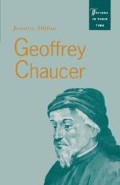Abstract
As Chapter 4 showed, the study of ideas in the Middle Ages was conducted in Latin within an internationally mobile cultural context. The academic establishment was composed of male clerics (even members of the other two professions, medicine and the law, usually held at least minor offices within the Church, though they were not necessarily ordained) with the result that philosophers were almost of necessity theologians. The importance of the Christian hegemony underpinning intellectual exploration up to the fourteenth century cannot be overestimated. Reasoning could take place only within the confines of faith: if it overstepped these limits it was promptly denounced as heresy. The fourteenth century is significant, in terms of the development of philosophy, as the age when a few thinkers begin to suggest the existence of a possible gap between reason and faith, and it is perhaps symptomatic that its two most influential thinkers, Ockham and Wyclif, were accused of heresy.
Preview
Unable to display preview. Download preview PDF.
Notes
G. Leff, Medieval Thought (Harmondsworth: Penguin, 1958) p. 92; D. Knowles, The Evolution of Medieval Thought (London: Longman, 1962) p. 87. I cite these two definitions in particular since both these surveys of medieval philosophy have been formative influences on the writing of this chapter.
The Autobiography of Gimldus Cambrensis, ed. and trans. H. E. Butler, intr. C. H. Williams (London: Jonathan Cape, 1937) p. 97.
See further J. A. W. Bennett, Chaucer at Oxford and Cambridge (Oxford and Toronto: Oxford University Press, University of Toronto Press, 1974) ch. 3, ‘The Men of Merton’; and
F. M. Powicke, The Medieval Books of Merton College (Oxford: Oxford University Press, Milford, 1931).
Defensio Curatorum, in Dialogus inter Militem et Clericum etc, ed. Aaron Jenkins Perry, EETS, OS, 167 (1925) p. 59.
See Philotheus Boehner, sel., ed. and trans., Ockham: Philosophical Writings (Edinburgh: Thomas Nelson, 1957), pp. xii–xiii.
Umberto Eco outlines this debate in his novel, The Name of the Rase, trans. William Weaver (London: Secker and Warburg, 1983) see, for example, pp. 12–13, 49–52, 338–43.
Far more is written about Wyclif’s life than about Ockham’s. The best short account of his life and thought is Anthony Kenny’s Wyclif (Oxford: Oxford University Press, 1985), to which this summary of Wyclif’s life is indebted. See also Anne Hudson’s entry on Wyclif in the Dictionary of the Middle Ages.
This question was the centre of much bitter debate, particularly during the latter half of the fourteenth century — see further Wendy Scase, Piers Plowman and the New Anti-Clericalism, Cambridge Studies in Medieval Literature, 4 (Cambridge: Cambridge University Press, 1989).
Knighton, Chronicon, II.151, cited in R. B. Dobson (ed.), The Peasants’ Revolt of 1381 (London: Macmillan, 1970) p. 376.
Fasciculi Zizaniorum, ed. Walter Waddington Shirley, RS, 5 (1858) pp. 272–4; trans. Dobson, Peasants’ Revolt, p. 378.
De Veritate Sacrae Scripturae, cited in Peggy Knapp, Chaucer and the Social Contest (New York and London: Routledge, 1990) p. 73.
Chaucer at Oxford and Cambridge, p. 16. I am aware of only one study that considers Chaucer’s debt to Ockhamite thinking at any length: Sheila Delany’s Chaucer’s House of Fame: the Poetics of Skeptical Fideism (Chicago and London: University of Chicago Press, 1974). The influence of Wycliffism on Chaucer has been more frequently considered, ever since John Foxe first described Chaucer as a ‘right Wiclevian’ (p. 145 below). See, for example, Peggy Knapp, Chaucer and the Social Contest and writers listed in ch. 1, n. 56 above.
Geoffrey Shepherd, ‘Religion and Philosophy in Chaucer’, in D. S. Brewer (ed.), Writers and their Background: Geoffrey Chaucer (London: G. Bell, 1974) p. 281.
Tractatus contra Benedictum, iii, in Guillelmi de Ockham Opera Politica, vol. III, ed. H. S. Offler, (Manchester: Manchester University Press, 1956) p. 231; cited in B. Smalley, English Friars and Antiquity in the Early Fourteenth Century (Oxford: Basil Blackwell, 1960) p. 29.
F. X. Newman (ed.), Social Unrest in the Late Middle Ages, Medieval and Renaissance Texts and Studies, 39 (Binghamton, NY, 1986) p. 121.
Copyright information
© 1993 Janette Dillon
About this chapter
Cite this chapter
Dillon, J. (1993). ‘Greet altercacioun’: The Influence of Philosophy. In: Geoffrey Chaucer. Writers in their Time. Palgrave, London. https://doi.org/10.1007/978-1-349-22713-6_5
Download citation
DOI: https://doi.org/10.1007/978-1-349-22713-6_5
Publisher Name: Palgrave, London
Print ISBN: 978-0-333-54203-3
Online ISBN: 978-1-349-22713-6
eBook Packages: Palgrave Literature & Performing Arts CollectionLiterature, Cultural and Media Studies (R0)

